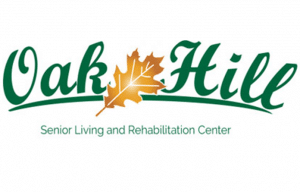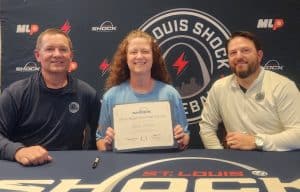All about masks in Columbia
Much to the disappointment of the crowd that occupied Parkview Elementary’s gym bleachers – some even holding signs urging for the district’s masking policy to be reversed – the Columbia School Board voted it would continue to comply with Gov. JB Pritzker’s mask mandate.
Pritzker’s recent executive order requires masks to be worn inside all school buildings. On Thursday, the board decided to comply with this mandate when it unanimously voted to approve its 2021-22 Re-Opening Plan. The plan states masks are to be worn while indoors unless “performing tasks that cannot be completed while wearing a face covering,” such as eating or drinking.
This was not an easy decision, school board members acknowledged. However, after considering the impacts of the sanctions that could come from disregarding the order – such as having state funding pulled, not being able to compete in athletics and student diplomas not being recognized by the state – the board voted to comply.
“I told people I would never vote for masks … but if the masks keep us in school, keep (the students) playing, keep them doing what they have to do, then that’s the bitter pill we have to swallow,” board member Andrea Khoury said.
For school board president Greg Meyer, his vote to comply with Pritzker’s order was mostly based on the board’s fiscal responsibility to its constituents. He warned that going against Pritzker’s order would cause the community to shoulder the financial burden of losing state funding, among other costs.
“I personally don’t think (Pritzker) has the power to (enforce a mandate) either,” Meyer said, referencing a topic many community members spoke on during the public comment portion of the meeting. “But, it’s what fight are we willing to fight? How much of your money are we willing to spend? Somebody made the comment earlier that we took an oath to protect your assets, and (it is) one of my views that it’s what we’re doing.”
Meyer said it is his personal opinion the board should not spend the money to challenge the mandate in court, as a Clinton County parent and two parents from McHenry County are doing.
“I always say don’t fight a fight that somebody else is willing to fight and we have two school districts currently that have already filed suit against the state. Let them spend their money and let’s ride on their coat tails and see what happens,” Meyer said.
Prior to its board meeting Thursday night, the Red Bud school district was planning on sticking with its original “mask optional policy.”
After being placed on probation by the state, Red Bud had 60 days to alter their plan to comply with the executive order before it would begin losing state funding as well as the other sanctions mentioned above.
Columbia Superintendent Chris Grode announced during Columbia’s meeting Thursday night that the Red Bud board decided to comply with Pritzker’s mandate, with mandatory indoor masking to go into effect the following week.
Columbia’s decision to adopt mandatory indoor masking unless under specific circumstances came the same day the Staunton school district announced it will be taking an “adaptive pause” to in-person instruction after an increase in cases in the area.
Monroe County Health Department Administrator John Wagner told the Republic-Times that the decision to shut schools down in Monroe County would most likely be due to schools not having enough students attending in-person, should this topic even arise.
“Right now we’re going to look at it as, as long as we don’t have kids going to the hospital sick, then as long as there’s enough students to make school even worthwhile, the schools will stay open,” Wagner said.
Mental health matters
Some sported homemade signs, some wore Columbia blue, some were Columbia students while others barely looked old enough to attend school, but one thing united the large majority of the meeting’s crowd – they did not want another school year with masks.
Out of the many parents, students and community members who spoke during the public comments portion of the meeting, only one urged the school board to continue to comply with Pritzker’s order.
A large topic of discussion from parents at the meeting was the toll another restrictive school year could have on students’ mental wellbeing.
Greg Schmidt told the board this is something his family is currently battling, and he knows they are not the only ones, citing increases in suicide attempts and antidepressant use in people under 18.
“So many parents that I know are experiencing that same thing right now. It’s very real,” Schmidt said, later concluding his address to the board with, “The final thing I want to say to you is you all have to place a bet. It’s a tough bet. Like I said I don’t envy you, but you have to place a bet at their physical health at .001 percent, or mental health where if you don’t change direction, you will have suicides this year that we’re going to be dealing with.”
This figure was published in a recent New York Times article.
“Nationally, roughly 1 percent of children who are infected with the virus end up hospitalized, and 0.01 percent die, according to (American Academy of Pediatrics) data. Both hospitalization and death rates have declined since last summer,” the article said, while also warning hospital rates are a “lagging indicator” and only time will tell the exact impacts of the Delta variant.
Many speakers also questioned if the governor has the legal authority to make such a mandate and if the Illinois State Board of Education can legally pull funding for schools for non-compliance. Such is the topic of multiple lawsuits.
Learning
Students as well as parents worried how remote learning would be handled if a student were quarantined as a close contact or isolated if COVID-positive.
“My question for tonight is: What is the school’s remote learning policy (for) the kids who are quarantined, and how will the children get the help they need when they are home without instruction from their teachers?” Columbia High School junior student Mary Brooks asked the board. “Now since we’ve started school, a couple of teachers have reached out to their students offering remote learning if quarantined. However, I believe it should be offered to every student in this situation. Therefore, I am nervous about being quarantined due to the exposure and not getting the help I need.”
Because of the most recent IDPH and ISBE quarantine guidance, Grode said he expects the number of students quarantined due to exposure to be minimal.
As Wagner previously told the Republic-Times, unvaccinated individuals – provided they and the positive individual are masked – need to quarantine only if they have been within three feet or less of each other.
Grode said the classrooms should be able to maintain a distance of three feet between students, and because they are consistently masked under Pritzker’s mandate, there should be few quarantined due to classroom exposure.
The problem, Wagner said, are the buses and lunch rooms.
Grode told the Republic-Times in an interview Friday that since there should be few students taken out of school as close contacts, he is confident the teachers will be able to work with that individual student to determine the best remote learning approach for them. He said this will be based on how the student did last year with the remote learning options.
“It’s really because there’s so few people being excluded from school because we’re wearing masks and what not, so it’s really going to be individualized,” Grode said, later adding, “The fact of the matter is the ideal situation is to have everybody in school, and so we’re trying to ensure that we can meet everyone’s needs for those who aren’t and … synchronous instruction did not work for everyone. So, we don’t want to do it for those it didn’t work for, and we’ll have to do that on a case-by-case, class-by-class basis.”
Mask effectiveness?
Some meeting attendees, such as Jared Dinkelman, questioned the validity of the pandemic, as he said “COVID-19 doesn’t exist. Others were specifically concerned about masks. The overall effectiveness of masks in preventing disease was called into question.
Many who spoke during the public comments portion even argued they do more harm than good.
Nicholas Helfrich, who grew up in the area, said he has 16 years experience working with flexible and adhesive materials. He said this has granted him ample time working with N95 masks.
“That mask has not been designed for what we are up against right now,” he said, later talking about cotton masks, “They’ve had a year to come up with some type of government spec … we have not come up with any type of standard … and unless we are going to really look at this and micromanage and come up with a spec that is going to allow the correct amount of oxygen in, collect the right amount of dust and gets rotated at a proper schedule … you’re going to be causing tremendous harm to our kids long-term.”
Even among public health officials, the exact effectiveness of masks is still under debate. Many show that of the masks on the market, N95 or FFP2 respirators are better than cloth ones.
Wagner told parents Thursday that whether or not masking mandates make a difference in school infection rates is still to be seen.
“I am looking at schools, or will be looking at schools as we get back, and comparing the masking schools to unmasking schools. Now, I may have to go outside the state to look at the unmasking schools,” Wagner said.
His next statement prompted a flurry of applause from the bleachers.
“My personal opinion, not that of the public health department: I don’t think we’re going to see much difference,” Wagner said.
Student voices
Taylor Etheridge, a junior at Columbia High School, took to the podium with several other classmates standing by her side. While Etheridge gave many reasons why she did not support the mask mandate, perhaps the most simple was the common consensus she found CHS students share.
“I’ve asked many students over my social media platforms what they wanted, so it just doesn’t come from me and my friends because that’s not fair, and … 75 kids said ‘no’ and four people (said) ‘yes, I want to wear masks,’” Etheridge said. “So, that’s why we just ask for it to be optional … we hung out this summer without masks and none of us got COVID.”
She also stated the school seems to “pick and choose” when to social distance students, citing hallway congestion as a particular area of concern.
“We walk into school, we’re all friends and everything, but we’re still right next to each other in hallways, like shoulder-to-shoulder, closer than we are right now,” Etheridge said.
Grace Laskowski, another CHS junior who spoke to the board, said the hallway situation is “a joke.”
When asked about this, Grode said last year CHS staggered times students would be let out of class to avoid “log jams,” but with it only being the second day of school at the time of the meeting, CHS did not know exactly where problem areas were and therefore were not preemptively able to fix them.
“It’s one of those things where you build the schedule, but you don’t actually know if there’s going to be a jam until you actually see that. So, this week they’ve been watching very closely and tweaking things,” Grode said. “If the hallways were as clogged as she said, we are going to fix that and address it.”
Other business
The board also approved a resolution for Grode to work with the Regional Office of Education to begin the process of obtaining voluntary COVID testing.
Much like Waterloo discussed at its school board meeting earlier in the week, getting a rapid test and University of Illinois SHIELD test will help ensure students can participate in the test-to-stay close contact option. This option can help limit the number of close contacts quarantining who are not actually sick.
The school board unanimously approved this resolution.
The board also approved displaying the 2021-22 budget, which will be up for approval at next month’s board meeting. This ensures the board meets the 30-day required display period.






